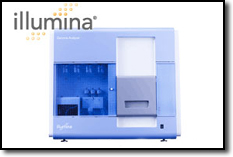Illumina technology is based on massively parallel sequencing of millions of fragments of DNA using reversible terminator-based sequencing chemistry. This technology relies on the attachment of randomly fragmented DNA to a planar, optically transparent surface. Attached fragments are extended and bridge amplified to create an ultra-high density sequencing flow cell with millions of clusters, each containing ~1,000 copies of the same template. These templates are sequenced using a robust four-color DNA sequencing by synthesis technology that employs reversible terminators with removable fluorescent dyes. High-sensitivity fluorescence detection is achieved using laser excitation and high speed scanning optics. Alternative sample preparation methods allow the same system to be used for a range of applications including gene expression, small RNA discovery and protein-nucleic acid interactions. Our facility offers library preparation services from the point of purified and properly prepared DNA or RNA. We are able to make libraries for genomic, mRNA-seq, totalRNAseq and ChIP-seq samples. We offer target capture, both exon and custom, using the Agilent SureSelect system. The customer must supply the kit from Agilent, and we will provide the remainder of the reagents, consumables and labor. You may purchase Illumina compatible primers and adapters through our facility stock room.
The Biopolymers Facility provides QC services multiple times per week. The table below lists the deadline for sample drop off and the day the service will be performed.
| Service | Drop Off Deadline | Services Performed |
|---|---|---|
| TapeStation & QPCR QC | Tuesday before Noon | Tuesday (TS) & Wednesday (QPCR) |
Sequencing services on the Illumina MiSeq are performed as soon as possible in the order they are received. Certain Harvard & HHMI labs that assisted in equipment purchases will automatically receive preferential queuing.
- Two Illumina cBot stations
- Three Illumina MiSeq sequencers
- Four Illumina NextSeq 500 sequencer
- One Illumina NextSeq 2000 sequencer
- One Illumina NovaSeq 6000
All samples should meet the following criteria:
- Submit at least 10µl of 0.5-1 ng/µl library.
- Deliver your samples in lo-bind eppendorf tubes (ex. USA Scientific "Low Adhesion Microcentrifuge Tubes" #1415-2600).
- Deliver your samples to a staff member, along with your order confirmation sheet.
If you have another concentration or volume, feel free to submit the libraries and we will let you know if there is enough material to run.
If the sample is deemed to be so concentrated that it is outside of these parameters and requires a dilution and an additional Tape Station run, there will be an additional charge.
Also note, because the functional library can vary from the concentration you have measured, we cannot tell you definitively whether or not your sample is sufficient to cluster until we have performed our QC.
The Illumina NextSeq 500 and MiSeq do not allow us to save images. As a result, the output from the Real Time Analysis (RTA) base caller will be the final data output you receive. In order for the software to properly identify clusters and provide a high yield of high quality sequencing reads, it is important that your input library be "base balanced" in the first ten cycles of your insert DNA. This is especially important for individuals using indexes introduced into the beginning of the sequence read, as these initial cycles are used to identify cluster location and size. Please ensure, when pooling your own libraries, your indexes are balanced at each base position (i.e. 25% A, C, G, T).
If you have never placed an order for Illumina sequencing, please feel free to contact us with any questions and we are happy to assist you through the process.
Please contact us at nextgen@genome.med.harvard.edu for pricing information for your specific project.
- HMS Storage - We encourage you to create an account on the mass storage array and directly access your data there.
- FTP - sequence and alignment files only (instructions).
- External Hard Drive - If you are interested, you will need to make arrangements for file transfer to an external drive with our facility computer staff. There are additional fees associated with this.
- FTP - sequence and alignment files only (instructions).
- External Hard Drive - If you are interested, you will need to make arrangements for file transfer to an external drive with our facility computer staff. There are additional fees associated with this.

